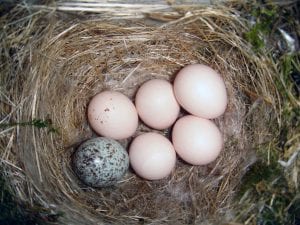The Discovery:
Researches at the Universities of Cambridge and Exeter are currently exploring issues regarding offspring recognition, particularly among Digger wasps and, more generally, among insect, bird, and fish species. Findings have presented the inability for a parent to recognize their offspring. Accredited with justifying this anomaly is Crozier’s effect. In essence, this effect requires individuals to simultaneously act as hosts and parasites.
What is a parasite’s motive?
I presume many of us find it difficult to envision our parents blatantly abandoning us. To a parasite, however, brood parasitism isn’t all that complicated of a decision. A parent’s decision to abandon their offspring (by placing its offspring in another’s nest, for example), is based on logic. Professor Jeremy Field of the University of Exeter explains how by abandoning their offspring, parent’s diminish the effort it would talk to raise their kin.
A Failure to Recognize ‘Cuckoos’:
Scientists have hypothesized as to why parents are failing to recognize their non-offspring. In fact, researchers believe that wasps whose features varied genetically correlated with wasteful rejection interactions. Therefore, it is possible that the frequency of such disadvantageous features diminished overtime (think: evolution). Ultimately, this would increase the number of similar-looking wasps, thus enabling parasitism to occur more regularly. To learn more about this study, please click here.
Above is an image depicting brood parasitism: a Brown-headed Cowbird egg in a Phoebe nest.
The Problem with Rejecting ‘Cuckoos’:
At times, the victims of brood parasitism are able to recognize cuckoos among their offspring due to blatant signs of genetic variation. Logically, one would assume that the host would then reject the non-offspring. However, this is not always the case. As shown in a Digger wasp study, the hosts actually kept foreigners in their nest, as removing them would require immense energy, along with a depletion of resources (i.e. food from the nest would be removed with the cuckoo).
The Investigation/Results:
To further investigate brood parasitism, scientists placed foreign wasps in a burrow to gage if the host would accept or reject its non-offspring. The results depicted that host did not treat its non-offspring any differently from its actual offspring. This leads scientists to believe that not only are wasps unable to differentiate between the two, but they are more likely to base rejection off of other aspects such as age.



Leave a Reply